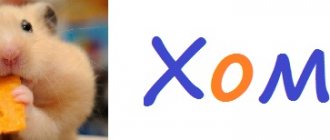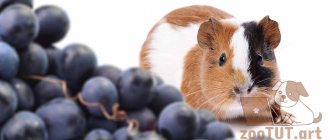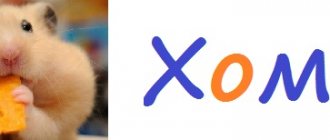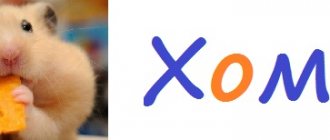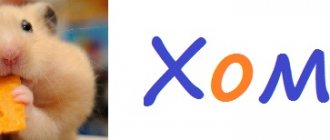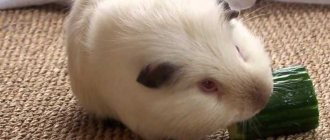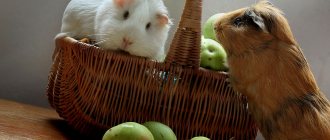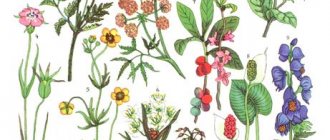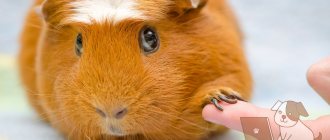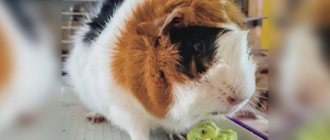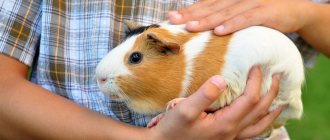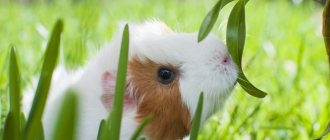- home
- Guinea pig
- Guinea pig nutrition
02/19/2019 A guinea pig is a wonderful pet. She is much more fun than a hamster; she is not so petite and demanding. To feed your guinea pig, you don’t need to go out of your way to choose an individual diet. However, sometimes you want to please your favorite animal with something tasty and unusual. You need to be sure that this tasty and unusual food will not harm the health of your fluffy. For example, can a guinea pig have a banana?
Do pigs eat bananas?
Banana is an incredibly healthy fruit. It is rich in potassium, nutritious fats. Eating one fruit will give you a lot of strength and energy.
Owners of guinea pigs often notice that the animal eats everything that gets into its cage. If you put a piece in, he will eat that too. But won't it cause harm? Can I feed my guinea pig bananas?
Along with the benefits from the banana, the animal will also receive considerable harm. Fruits contain a lot of sugar, which has an extremely negative effect on the overall health of any living organism. Thus, an elementary conclusion suggests itself - you can feed your pig bananas only in moderation; this is strictly prohibited on an ongoing basis.
Can guinea pigs eat banana chips?
Banana chips are dried banana pieces that many people eat as a snack. During the process of drying the fruit, the nutritional value of the banana changes. Banana chips contain much more sugar than a fresh banana, which means you should not feed banana chips to your pet. High levels of natural sugar are harmful to your guinea pig's teeth and cause stomach upset.
What are the benefits of bananas for a guinea pig?
The nutritional value of the fruit is what decides whether it is healthy for your guinea pig to eat. Nutritional value of 100 g of raw fresh bananas:
- Energy - 89 kcal
- Proteins - 1.09 g
- Carbohydrates - 22.84 g (12.23 g sugar)
- Fat - 0.33 g
- Vitamins – B1, B2, B3, B5, B6, B9 and C
- Minerals - iron, magnesium, manganese, phosphorus, potassium and zinc.
Although banana is quite high in natural sugar, this fruit does have some benefits for your guinea pig's diet. It offers a range of vitamins and minerals that are important for your guinea pig's health and is especially rich in vitamin B6.
What are the benefits of banana chips for your guinea pig?
The nutritional value of banana chips is different from the nutritional value of raw bananas. Nutritional value of 100 g banana chips:
- Energy - 520 kcal
- Proteins - 2.3 g
- Carbohydrates - 58.4 g (35.34 g sugar)
- Fat - 33.6 g
- Vitamins – A, B1, B2, B3, B6, B9, C, E and K
- Minerals - calcium, copper, iron, magnesium, phosphorus, potassium and zinc.
Although banana chips may contain a good range of vitamins and minerals, the natural sugar content is too high for guinea pigs. Dried banana chips are also high in fat.
What about banana peels?
Many owners believe that they should give their guinea pig a banana right away along with the skin. They have their own arguments on this matter. Still, this is a plant product, and its peel should not be dangerous to the health of your furry pet. Moreover, it must contain important nutrients, such as the spicy leaves.
Of course, if you don't separate the banana peel, your pet will eat it. But it will not produce any positive effect. Why?
Unfortunately, people do not have the opportunity to get them fresh. A lot of time passes from the time they are collected and transported to the stores. All this time they must maintain their presentation, otherwise everything will be in vain - they will “disappear” and they will not be bought. Therefore, fruits are covered with all sorts of harmful chemicals. This chemical is “absorbed” into the banana peel.
And now about the cheese itself
Cheese has beneficial properties. What does this product consist of? The main raw materials for its production are milk, starter culture, and rennet. According to the technology, the end result is a fairly fatty product.
But fatty foods are contraindicated for guinea pigs, since the animal’s gastrointestinal tract is completely unsuited to digesting such “dishes” and will not be able to cope with them.
Like all herbivorous animals, pigs do not have the enzymes “responsible” for the digestion of animal proteins and fats, therefore all products of this series are not only not recommended, but also prohibited.
This is a huge burden on the liver, where they are neutralized, and if your pet is treated to such food, this organ may fail at one moment. Likewise, the animal can die from developing vascular atherosclerosis and even a heart attack or stroke. And the owner will have no idea that poor nutrition is to blame.
The fat content of cheese is the number one negative indicator, but there are others, in particular:
- preservatives;
- spices;
- various flavoring additives;
- sugar;
- salt.
Here, as they say, comments are unnecessary.
Feeding rules
For a guinea pig, banana is primarily a sweetness. You can’t go overboard with sweets, no matter what animal you’re talking about. Before three months you should not give fruit, but after three months you need to follow the dosage.
You can enjoy treats every day, but the piece should not be more than one-fourth of the whole fruit. It should be introduced into the diet evenly, starting with one sixth or less.
Bananas are soft, so they are suitable as a treat for both young animals and “elderly” individuals. It doesn’t require much strength from your pet to chew a piece, and it will saturate the body with useful substances one way or another.
How to give correctly
Moderation is good in everything. In general, feeding a guinea pig, as a rule, involves 2-3 meals a day, where breakfast is “juicy food,” greens and hay. It is for breakfast that the bulk (but not the entire daily requirement!) of vegetables and fruits is served. You should be careful when introducing fruit into your diet, not only when it comes to exotic bananas, tangerines, and so on. Apples and pears, so accessible and understandable in our latitudes, are the most common cause of stomach upset in rodents. Most often, it is precisely because of the carelessness of the owners, who are focused on their own perception of these food products.
Possible problems
- Binge eating.
This occurs due to non-compliance with the dosage and is fraught with serious consequences. It is important to understand that animals, despite their instinctive thinking, are also capable of eating too much or too little.
If you consume bananas excessively, the animal will not be able to go to the toilet.
- Diarrhea and poisoning.
You always need to make sure that the product is of high quality and that the skin is completely peeled off. Otherwise, trouble in the digestive system is inevitable.
Bottle with drinker
Such an accessory will come in handy during street walks. It does not take up much space, weighs little and does not hinder movement. But you can offer the dog to quench his thirst at any time, and not wait until he starts drinking from a dirty puddle or lake overgrown with mud.
The device consists of a water container and a bowl equipped with a dispenser button. It allows you to release as much liquid from the bottle as the animal needs to quench its thirst. Sold in two volume options - 350 and 550 milliliters.
Price – 475 – 584 rub.
Another model of the same device has a folding shape, which makes it easier to carry. The transformer connects the bowl and the bottle, securely fixing them in such a compact state. The durable polymer material has good shockproof properties and can even resist dog teeth. True, this struggle will not be long and - if the owner is careless - then all the liquid will end up on the ground.
Volume 250 ml.
Cost – 133 – 148 rubles.
I like1I don't like
What other fruits and berries can you give?
Guinea pigs love fruits; there are no clear recommendations or contraindications. When choosing, you should consider two points:
- Vitamin C is essential for guinea pigs because their body does not produce it. Without its consumption, the animal can be completely paralyzed.
- Some foods are allergenic (citrus fruits), which is why you should first try giving a small dose and only if your pet reacts positively to it, continue feeding it.
Otherwise, these animals are very omnivorous, especially in matters of fruits and berries.
You can and even need to please your pet with bananas. And if you approach the issue responsibly and sensibly, then feeding will bring a lot of pleasure to the pig. And as you know, a happy pet makes its owners happy too.
Additional feed
Supplementary food does not mean it is of secondary importance in the diet. It just varies depending on the season and is interchangeable.
Green food
In summer, green food plays a very important role.
Useful herbs
Your guinea pig will benefit from: dandelion leaves, plantain lanceolate and greater, yarrow, nettle (young leaves), carrot tops, white and meadow clover, chickweed, alfalfa, heather, sedge (young), burdock, sow thistle, hogweed, wheatgrass , sage, field sow thistle, oats, peas, sweet clover, winter rye.
In limited quantities, your pet can be given tarragon, wormwood, parsley, and dill.
In spring, grasses (especially clover and alfalfa) are rich in protein, but poor in fiber, and therefore they are given in limited quantities.
In the spring-summer period, collecting herbs will not be difficult, unlike in winter, when the solution may be to independently grow herbs on the windowsill. Or, what’s even simpler, buy ready-made special grass grown for cats at a pet store.
You cannot collect herbs near highways and highways, in the yard, in dog walking areas, or near fields that are treated with special pest control products.
Do pets eat fruit?
Every owner of such a pet has noticed that the animal eats everything that is offered to it. And even if he eats a banana with pleasure, can he have this fruit? Since banana fruits are considered sources of potassium, the animal will receive considerable benefits from them .
But this does not mean that the rodent needs to be fed such a delicacy. After all, bananas also contain a lot of sugar, which negatively affects the condition of the guinea pig’s body. It is easy to conclude that such a product can be given to a pet, but in limited quantities .
Dairy
Can guinea pigs have milk?
Giving milk to guinea pigs is not recommended. The enzyme that is responsible for the breakdown of milk sugar (lactose) is found in insufficient quantities in the body of animals. If your pig drinks milk, the lactose will cause diarrhea and bloating. More serious diseases may develop in the future, so it is better to show your pet to a doctor.
Females can and even need to be given milk during lactation. You can soak crackers in milk and offer them to your pig.
The ban also applies to other dairy products: cottage cheese, cheese, yogurt and others.
Vegetable menu
Pigs have to look for vitamin C, which is responsible for the functioning of connective and bone tissues, from the outside, since their body is not able to produce it on its own.
Guinea pigs love apples, cucumbers and carrots.
Ascorbic acid enters the body from plant foods, including fresh vegetables (broccoli, bell pepper), amounting to at least 1 teaspoon per day.
Vegetables that can be given to guinea pigs include:
Controversial and dangerous vegetables include:
Fruits are rich in sugars, so they are not considered as a complete part of the diet, but exclusively as a delicacy.
Among all the abundance of fruits, only apples can be consumed by a guinea pig without strict restrictions. They normalize digestive processes and remove toxins. The seeds must be removed as they contain toxic toxins.
The following berries are allowed to be consumed:
Controversial and dangerous berries and fruits include:
IMPORTANT! When preparing your diet, please note that marine rodents are herbivores. Meat and dairy products are not digested by their bodies and pose a serious danger.
Nutrition Basics
In the wild, guinea pigs eat tree bark and branches, fruits, berries and leaves. The main material that ensures the smooth functioning of the digestive tract is fiber.
At home, the diet is based on:
IMPORTANT! Hay intended for gilts should be soft and green, and pelleted food should form a minimal part of the diet.
Rodents can be given no more than 120 g of fruits and vegetables per day. Food is provided in small pieces and removed in case of malnutrition. Overripe or rotten foods will cause digestive problems.
